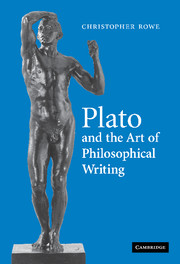Book contents
- Frontmatter
- Contents
- Preface
- Preliminaries: reading Plato
- THE DIALOGUES
- Introduction: The simile of the cave in the Republic
- 1 The Apology: Socrates' defence, Plato's manifesto
- 2 The Phaedo: Socrates' defence continued
- 3 ‘Examining myself and others’, I: knowledge and soul in Charmides, First Alcibiades, Meno, Republic, Euthyphro, Phaedrus
- 4 The moral psychology of the Gorgias
- 5 ‘Examining myself and others’, II: soul, the excellences and the ‘longer road’ in the Republic
- Appendix to Chapter 5: Socrates vs Thrasymachus in Republic I
- Interlude: A schedule of the genuine dialogues
- 6 Knowledge and the philosopher-rulers of the Republic, I: knowledge and belief in Book v
- 7 Knowledge and the philosopher-rulers of the Republic, II: the limits of knowledge
- 8 The Theaetetus, and the preferred Socratic–Platonic account of knowledge
- 9 The form of the good and the good: the Republic in conversation with other (‘pre-Republic’) dialogues
- 10 Republic and Timaeus: the status of Timaeus' account of the physical universe
- 11 Plato on the art of writing and speaking (logoi): the Phaedrus
- Epilogue: What is Platonism?
- Bibliography
- Index
Interlude: A schedule of the genuine dialogues
Published online by Cambridge University Press: 22 September 2009
- Frontmatter
- Contents
- Preface
- Preliminaries: reading Plato
- THE DIALOGUES
- Introduction: The simile of the cave in the Republic
- 1 The Apology: Socrates' defence, Plato's manifesto
- 2 The Phaedo: Socrates' defence continued
- 3 ‘Examining myself and others’, I: knowledge and soul in Charmides, First Alcibiades, Meno, Republic, Euthyphro, Phaedrus
- 4 The moral psychology of the Gorgias
- 5 ‘Examining myself and others’, II: soul, the excellences and the ‘longer road’ in the Republic
- Appendix to Chapter 5: Socrates vs Thrasymachus in Republic I
- Interlude: A schedule of the genuine dialogues
- 6 Knowledge and the philosopher-rulers of the Republic, I: knowledge and belief in Book v
- 7 Knowledge and the philosopher-rulers of the Republic, II: the limits of knowledge
- 8 The Theaetetus, and the preferred Socratic–Platonic account of knowledge
- 9 The form of the good and the good: the Republic in conversation with other (‘pre-Republic’) dialogues
- 10 Republic and Timaeus: the status of Timaeus' account of the physical universe
- 11 Plato on the art of writing and speaking (logoi): the Phaedrus
- Epilogue: What is Platonism?
- Bibliography
- Index
Summary
It may help readers of this book to have before them, for the purposes of orientation, a list of all the certainly genuine works with a note of what I take to be their real main subjects.
Apology: introduction/manifesto.
Crito: the implications of Socrates' ‘mission’ for the city of Athens and its institutions.
Euthyphro: on piety and wisdom/knowledge/expertise (Socrates consults a religious expert).
Charmides: on ‘sound-mindedness’ (sōphrosunē) and wisdom/knowledge/expertise (Socrates talks to someone said to be ‘soundminded’).
Laches: on courage and wisdom/knowledge/expertise (Socrates consults two generals).
Meno: on excellence and wisdom/knowledge/expertise (Socrates talks to a Thessalian aristocrat – and, briefly, an Athenian democrat, who is also one of his accusers: Anytus).
Ion: on excellence and wisdom/knowledge/expertise (Socrates consults an expert on the poets).
Protagoras: on excellence and wisdom/knowledge/expertise (Socrates confronts sophists).
Euthydemus: on excellence and wisdom/knowledge/expertise (Socrates confronts eristics).
Gorgias: on excellence and wisdom/knowledge/expertise (Socrates confronts orators/rhetoricians).
Hippias Minor: on the difference between excellence and other kinds of knowledge/expertise (Socrates talks to another sophist).
Lysis: on ‘friendship’, desire and the (real) good (Socrates talks to two friends).
Symposium: desire and the (real) good (Socrates confronts ordinary views of love and desire).
Phaedo: on the nature of philosophy (the love of/search for wisdom); life, death and the cosmos (Socrates talks to two members of his circle).
Cratylus: on language and reality (Socrates talks to representatives of two rival positions).
[…]
- Type
- Chapter
- Information
- Plato and the Art of Philosophical Writing , pp. 198 - 199Publisher: Cambridge University PressPrint publication year: 2007



